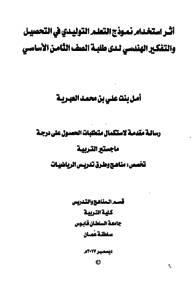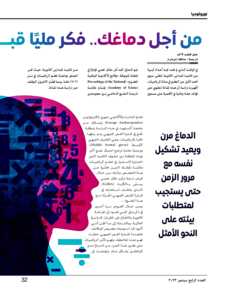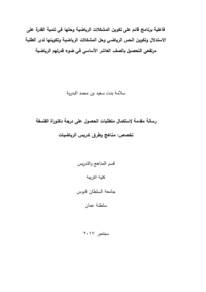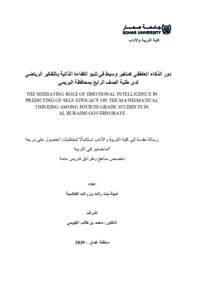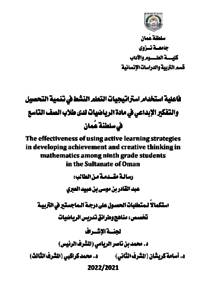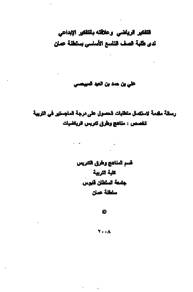Document
أثر استخدام نموذج التعلم التوليدي في التحصيل و التفكير الهندسي لدى طلبة الصف الثامن الأساسي
Publisher
جامعة السلطان قابوس
Gregorian
2017
Language
Arabic
English abstract
The study aimed at measuring effect of the use of the generative learning Model on achievement and geometric thinking for grade eight students in basic education. The researcher prepared tow tests:- The first one is testing the achievement and the other one is testing the ability to think geometrically throughout the first three levels i.e. visualization, analysis and informal deduction. The two tests have been verified for validity by a group of educators and have also been verified for reliability and calculating the internal consistency using-the method of Alpha Cronbach's, that reached (0.82) and (0.80) for the tow tests respectively.
Sample of the study consisted of (59) students form the basic grade eight in Um Waraqa AL Ansari Basic Education School. They have been divided into two groups: experimental group which aimed to study the geometry unit using the generative learning Model and a control group which to study the same unit by a traditional teaching method. The two tests, the achievement test and geometrical thinking test, were applied upon the sample completing studying of the teaching unit. The results showed that the experimental group has exceeded the control group in both achievement and the geometrical thinking in the first three levels i.e. (visualization, analysis and analysis and informal deduction), throughout evidence of statistical differentiation at the level of significance (Q2 0.05) between the students' scores in the experimental and the control groups in the two tests. In light of this study, the researcher has provided many recommendations such as encouraging teachers to use the generative learning Model in teaching, taking care of developing levels of geometric thinking in mathematics using Van Heal Modeling. She also provided many suggestions such as studying the effectiveness of using the generative learning Model on other variables such as Mathematical proof.
Description
رسالة جامعية
Member of
Resource URL
Arabic abstract
هدفت هذه الدراسة إلى التعرف على أثر استخدام نموذج التعلم التوليدي في التحصيل والتفكير الهندسي لدى طلبة الصف الثامن الأساسي. وقد قامت الباحثة بإعداد اختبارين أحدهما في التحصيل الهندسي، والآخر في التفكير الهندسي للمستويات الثلاثة الأولى (التصوري، التحليلي، الاستدلال غير الشكلي)، وقد تم التحقق من صدق الاختبارين بعرضهما على مجموعة من المحكمين، كما تم التأكد من ثباتهما باستخدام طريقة الاتساق الداخلي (طريقة ألفا كرونباخ) والذي بلغ (۰٫۸۲)، و(۰٫۸۰) على الترتيب. تكونت عينة الدراسة من (59) طالبة من طالبات الصف الثامن الأساسي بمدرسة أم ورقة الأنصارية للتعليم الأساسي للصفوف (۷-۱۰)، وتم تقسيم الطالبات إلى مجموعتين: مجموعة تجريبية درست وحدة الهندسة باستخدام نموذج التعلم التوليدي، ومجموعة ضابطة درست نفس الوحدة بالطريقة المعتادة. بعد الانتهاء من التدريس تم تطبيق اختبار التحصيل الهندسي، واختبار التفكير الهندسي على عينة الدراسة. وقد أظهرت النتائج تفوق المجموعة التجريبية على المجموعة الضابطة في التحصيل الهندسي وفي التفكير الهندسي، وذلك من خلال وجود فرق ذو دلالة إحصائية عند مستوى دلالة (a <۰٫۰۰) بين متوسطي درجات الطالبات في المجموعتين الضابطة والتجريبية في الاختبارين. وفي ضوء نتائج الدراسة إقترحت الباحثة عدة توصيات منها ضرورة تشجيع المعلمين على استخدام نموذج التعلم التوليدي في التدريس، والاهتمام بتنمية مستويات التفكير الهندسي في الرياضيات وفق نموذج فان هيل. ومن ضمن المقترحات دراسة أثر استخدام نموذج التعلم التوليدي على متغيرات أخرى مثل: البرهان الرياضي.
Category
Theses and Dissertations

